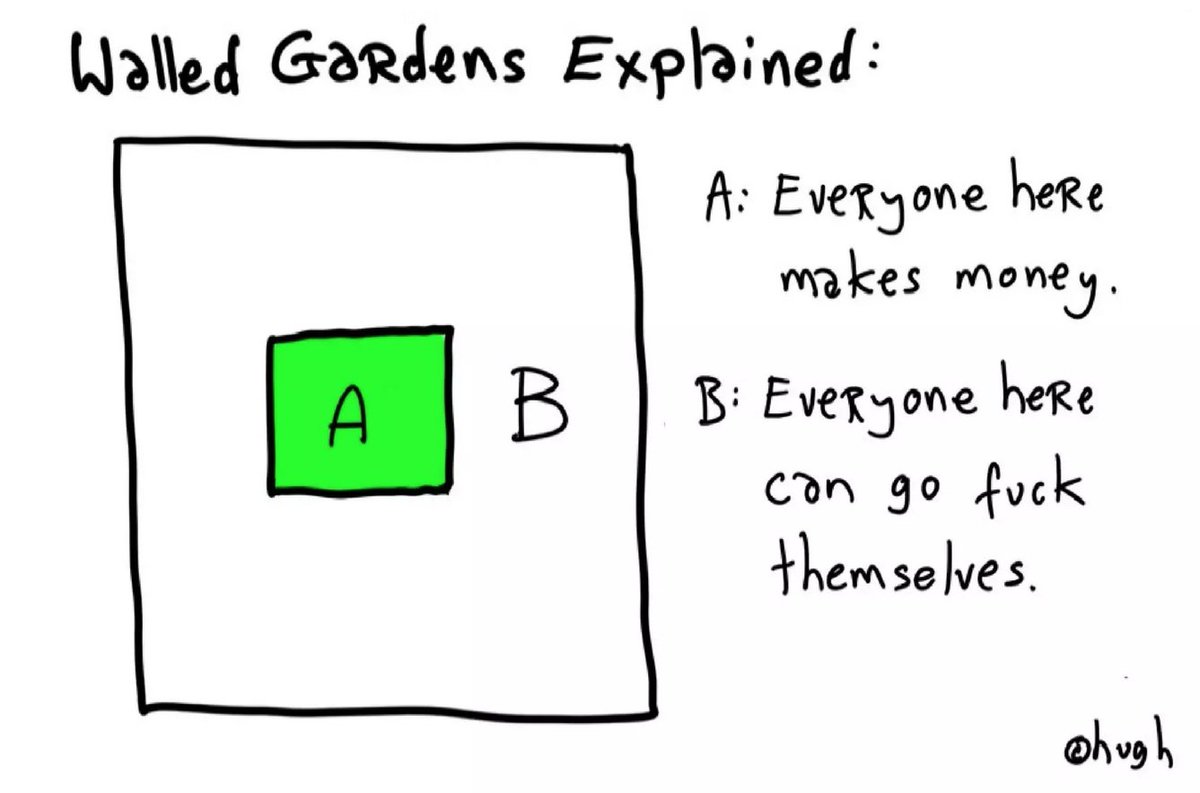silo

A silo or web content hosting silo (AKA walled garden), in the context of the IndieWeb, is a centralized web site (like most social media) typically owned by a for-profit corporation that stakes some claim to content contributed to it and restricts access in some way (has walls).
Silos are characterized by the following:
- require you to create an account specific to that site to use it (silo identity)
- allow you to interact on the site only with others with accounts on the site (silo contacts / social network)
- allows you to post some type of content (text, hypertext, images, video)
- and typically one or more of the following:
- an access wall that prevents indexing of (at least some of the) content you contribute
- a restrictive terms of service (TOS)
- claims some ownership or license to any content you create within the silo
- restricts your ability to import/export your content, or content about your content (e.g. comments, tags)
In contrast, see: commons.
Perspectives
What are the silos? Control. The silos are computer-generated dream worlds built to keep us under control in order to change a human being into this.
[holds up chart showing clicks on ad units]
(with apologies to [1])
History
For a brief history of the rise and fall of various silos, see the History page for launch, acquisition, death, and zombification years/dates. See site-deaths for upcoming and past silo deaths in particular.
Popular Silos
These silos are both popular, and used by a number of indiewebcamp community members (often via POSSE) to stay in touch with their friends.
If you have friends that are active on a popular silo, feel free to add it to this list.
Historical Popular Silos
Many popular silos have ceased functioning or otherwise shut down, debunking "too big to fail" assumptions.
- Google+
- MySpace (~2002-2009?) - so much control over the HTML and CSS of your profile page that many compared it to GeoCities, and not in a flattering way.
See site-deaths for more.
Specialized Silos
- Netflix - Movie ratings and reviews
- Nike+ - tracks some exercise information
- Strava - GPS sport tracking
- Geocaching.com - geocaching activity tracking
- Bandcamp - independent music publishing
- ...
Add any silo to this list that you're an active user of and especially if you can document how to export data from it.
Silo Flexibility
A few silos have given users tremendous flexibility in the look and feel of their experience and the content they post, and sometimes even allow using your own domain, for an extra fee:
Currently:
- Blogger - quite a bit of control via templates
- Tumblr - also lots of control via templates
- WordPress.com - some choice of free templates, and more choices as a paid option. Of all these, WordPress.com has some of the best import/export support, very low walls as it were for a walled-garden
Silo Innovations
Silos have innovated UX since 2003 far more than the blogging/RSS/Atom "communities" (as much as there was such a thing).
Here are some examples of UX innovations that silos either created, popularized, or refined to be much more usable, in rough temporal order.
- favorites - Flickr (2004)
- Integrated reading/creating UI - LiveJournal, Delicious (2004), Tumblr, Twitter (2006), Facebook (2006? when did Facebook launch their Newsfeed?)
- checkins - Dodgeball (2005), Foursquare (2009?), copied by Facebook (2010?)
- scrobbles - Last.fm (2000-2005? what year exactly?)
- block - Flickr (2005-07-27 per [3], before that they had an ignore feature (superseded by block) which sounds like a harsher form of mute)
- likes - introduced by FriendFeed 2007-10-03[4], then copied soon after by Facebook which quickly popularized them.
- reply-context - Twitter (20??-??-??). It was a small but important incremental step to go from reply posts on their own pages (see "User Innovation Inside Silos" below) to displaying the context of what those reply posts (tweets) were in reply to.
- recursive reply-contexts - Twitter. Another incremental if obvious step, Twitter started displaying the reply contexts of reply contexts themselves, all the way on up to an original tweet.
- Aaron Swartz invented this first - example
- recursive reply-contexts - Twitter. Another incremental if obvious step, Twitter started displaying the reply contexts of reply contexts themselves, all the way on up to an original tweet.
- legacy contact - Facebook (introduced 2015-02-12)
- ... add more and attribute the innovating silo
User Innovations Inside
Despite silos typically exerting tight control over their look, feel, and overall user experience, users have found ways of innovating inside silos, which silos have often adopted and integrated into their UX.
- reply permalinks - Twitter - reply posts on their own permalinks instead of just fragment links on a post.
- Specifically, @-replies, were previously "only" in comments (e.g. comments in MySpace and Flickr used @-name conventions to indicate who they were responding to in a thread). When Twitter users started using @-reply syntax[5][6] in tweets to intentionally direct their tweets at particular people, Twitter adopted this in multiple ways:
- auto-link @-mentions to profile pages (was in response to user-behavior)
- show @-reply tweets only to those who followed both the replier and the user being replied to.[7]
- auto-fill "Reply" textarea underneath a tweet with @-mention of the tweet author
- auto-fill "Reply" textarea also with @-mentions of anyone else mentioned in the tweet.
- Specifically, @-replies, were previously "only" in comments (e.g. comments in MySpace and Flickr used @-name conventions to indicate who they were responding to in a thread). When Twitter users started using @-reply syntax[5][6] in tweets to intentionally direct their tweets at particular people, Twitter adopted this in multiple ways:
- hashtags - as proposed by Chris Messina[8] on Twitter, then adopted by users, then eventually auto-linked by Twitter to search results for mentions of that hashtag.
- retweets - the "RT @-name:" syntax (originally ReTweet:) was purely a user innovation to indicate that they were passing along text/content from another user. Twitter both:
- codified "RT" into a one-click button (so easy to use as to cause million+ retweeted posts)
- showed the original author of the tweet, when presenting the retweet in others' reading views.
- 🍞 for like - Ello users in Germany adopted a convention of typing ":bread:" to generate a bread emoji (🍞) in a comment as a simple indicator of "liking" a post, since Ello lacks an explicit like/favorite feature.
- ... add more user innovation inside silos with attribution to user(s) if known, and inside which silo.
Criticism
See why for more common issues with silos in contrast to having your own website.
Linkwrapping
Many silos wrap any links posted on them with their own domains or link-wrapping domains, sometimes in an attempt to make links shorter, sometimes to provide a bottleneck which they can use to mass disable spam/phishing links.
Downsides:
- Breaks link referrals (you just see the silo wrapper, not the actual post that linked to your domain)
- Fragile for all the usual link-shorteners by a site other than the owner are fragile problem. As well as their typical use of database ids.
Examples:
- Facebook: m.facebook.com/l.php...[9]
- Twitter: t.co
- Feedly: Feedly Short URL fail
- ... others?
Artificially Slow UI
- 2016-07-06 The UX Secret That Will Ruin Apps For You
Facebook actually slows down its interface to make users feel safe, a Facebook spokesperson confirmed in an email.
... various services on the web including travel sites, mortgage engines, and security checks are all making a conscious effort to slow down their omnipotent minds because our puny human brains expect things to take longer.
... companies introduce what Kowitz calls an "artificial waiting" pattern into their interfaces. These are status bars, maybe a few update messages, to construct a facade of slow, hard, thoughtful work, even though the computer is done calculating your query.
Another good reason to use your own tools (if it's faster than expected, you feel accomplished, not distrusting), or at least re-use indieweb software etc. that others are eating what they cook because you know they won't be (or there's at least less chance of them) deliberately slowing it down.
Perverse Incentives on Content
- 2021-08-29 OnlyFans and the Myth of Owning Your Hustle
While it seems like platforms today are more interested in investing in the users responsible for their success via grants and creators programs aplenty, the reality is that the platform still dictates the terms. They’re not only the point of access to your audience; they’re also the ones deciding what metrics to use, and what counts as a success—and all of that is subject to change over any given quarter
On Instagram, the idea that accounts should make use of all the features the platform promotes in order to be successful lies somewhere between an open secret and industry-accepted theory. (This is at least partly why your chef influencer friend keeps posting Reels…)
If you create content on someone else’s platform, they can force you to make your content using a certain style or method by ranking you based on their own performance metrics.
Silo Quitting
A number of individuals, prominent and otherwise, have publicly "quit" various silos
Vaporware Silos
From time to time, silo projects are announced without shipping, and often never ship. As this list grows we can consider creating a separate vaporware-silos page.
- Cybe appears to be a splash screen and silo at cybe.me with a ton of rhetoric ("manifesto", "vision", etc.) but no product. Their Twitter hasn't been updated in over a year.
- ... add other silos that have been announced but not shipped, preferably with a citation to the announcement, preferably date-stamped.
Articles and Talks
- 2017-04-18 Maciej Cegłowski talk: Build a Better Monster: Morality, Machine Learning, and Mass Surveillance
- 2017-05-23 Eric Petitt: Browse Against the Machine
See Also
- site deaths
- silo-quits
- bulshytt
- history
- sites with data portability
- commons
- monoculture
- site changes
- 2017-12-03 Joshua Topolsky / The Outline: The death of the internet / If we lose this, we lose everything.
- https://www.eff.org/the-story-of-wael-abbas
- 2017-10-30 The Web began dying in 2014, here's how
- https://twitter.com/MattWilcox/status/1069716096410882048
- "If there is one thing we need to reassess as good stewards of the web, it is that we were right to be wary of centralised services. Easy personal websites and RSS were great ideas, and we need those revisiting. Censorship is harder when we have the control that was ceded." @MattWilcox December 3, 2018
- Criticism: cultural mismatch with reality: https://twitter.com/internetrebecca/status/1098005600909307904
- "basically every day someone tells me they figured it out & all the gov data should be on 1 enterprise system & according to 1 standard & linked & that’s it, no specific goal after that
🤔 fascinating idea w no understanding of reality or why things happen, ty for that, again" @internetrebecca February 19, 2019
- "basically every day someone tells me they figured it out & all the gov data should be on 1 enterprise system & according to 1 standard & linked & that’s it, no specific goal after that
- “they absolutely have a cost: the cost is complexity, outsourced agency, and brittleness. The cost of ownership is up front and visible; the cost of access is back-dated and hidden.” https://alexdanco.com/2019/10/26/everything-is-amazing-but-nothing-is-ours/
- https://tosdr.org/ Terms of Service; Didn't Read has a ranking system and describes features that might serve as a proxy for defining a silo
- Criticism: https://twitter.com/generativist/status/1216770253264322568
- "I've been researching social media developer ecosystems for a few days now. The one and only constant seems to be an obvious (and damning to me) one:
Inevitably the drawbridge gets pulled up." @generativist January 13, 2020
- "I've been researching social media developer ecosystems for a few days now. The one and only constant seems to be an obvious (and damning to me) one:
- making indie site scaling harder by buying up operations as a service companies https://www.eff.org/deeplinks/2020/06/technical-excellence-and-scale (
 Ryan Barrett: this article seems out of touch. it feels like we've never seen more operations as service offerings. definitely way more than 20-30y ago, and probably also more than 10y ago. hell, the big shift over the last 10+y is that the big companies mentioned in the article all offer more of their own stuff as cloud services, which were often purely internal before. obviously google, amazon, MS, but also even FB and apple, etc)
Ryan Barrett: this article seems out of touch. it feels like we've never seen more operations as service offerings. definitely way more than 20-30y ago, and probably also more than 10y ago. hell, the big shift over the last 10+y is that the big companies mentioned in the article all offer more of their own stuff as cloud services, which were often purely internal before. obviously google, amazon, MS, but also even FB and apple, etc) - corporate web
- https://twitter.com/eevee/status/1459956937202626560
- "silos took over because they're massively convenient in a lot of ways. the web3 folks don't seem to understand that (even as they cluster around convenient silos like opensea) and don't have answers to any of the compelling reasons people use silos in the first place" @eevee November 14, 2021
- Why: thread: https://twitter.com/danyork/status/1463273749407571972
- "Centralization happened to the web as platforms emerged that made it even *easier* to post, share, and discover content.
You didn't need a web server or learn HTML.
You could just go on the platform and start creating content and sharing it with other people.
2/" @danyork November 23, 2021
- "Centralization happened to the web as platforms emerged that made it even *easier* to post, share, and discover content.
- Why: https://twitter.com/danyork/status/1463273760941817865
- "The platforms' success is because they made it EASIER than the "web 1.0" services to:
- discover, connect with, and message people (& avoid spammers)
- create content
- share content with other people
- discover new content
- make money (minus the platform's share of course)
8/" @danyork November 23, 2021
- "The platforms' success is because they made it EASIER than the "web 1.0" services to:
- ^ https://twitter.com/danyork/status/1463273762812571658
- "The platforms made it "free" for all of us to have:
- publishing
- storage of content (text, images, videos)
- messaging and real-time communication in text, voice and video
- identity / authorization
- discovery through a centralized directory
All "free". AND...
9/" @danyork November 23, 2021
- "The platforms made it "free" for all of us to have:
- https://twitter.com/whitingdev/status/1472074920670629891
- "primary motivators for centralization:
a) they copyrighted it
b) they scaled it first
c) their protocol isn't user controlled and needs central/federated servers
d) network-effect user collab
e) site-specific search outperforms crawlers" @whitingdev December 18, 2021
- "primary motivators for centralization:
- Needs to be a pull quote near the top: https://twitter.com/tveastman/status/1069674780826071040
- "I'm old enough to remember when the Internet wasn't a group of five websites, each consisting of screenshots of text from the other four." @tveastman December 3, 2018
- Criticism: https://twitter.com/jack/status/1510314535671922689
- "the days of usenet, irc, the web...even email (w PGP)...were amazing. centralizing discovery and identity into corporations really damaged the internet.
I realize I'm partially to blame, and regret it." @jack April 2, 2022
- "the days of usenet, irc, the web...even email (w PGP)...were amazing. centralizing discovery and identity into corporations really damaged the internet.
- https://twitter.com/thecodetrotter/status/1537020929045413888
- "@spolsky welcome to the ShittyWeb@tm
@WeAreDevs #WeAreDevs" @thecodetrotter June 15, 2022
- "@spolsky welcome to the ShittyWeb@tm
- ^

- “I am shifting my participation so that I only participate in commercial silos when absolutely necessary” a silo can never provide digital autonomy to its users
- Possible new silo header image, even a few of the names are defunct:

- Walled Garden graphic: https://twitter.com/dug/status/1612483420365459465
- "This: https://tantek.com/2023/005/t3/indieweb-simpler-approach
reminded me of this...
which reminded me why I maintain this:-) https://donkeyontheedge.com" @dug January 9, 2023
- "This: https://tantek.com/2023/005/t3/indieweb-simpler-approach
- ^ more like comic by Hugh:



